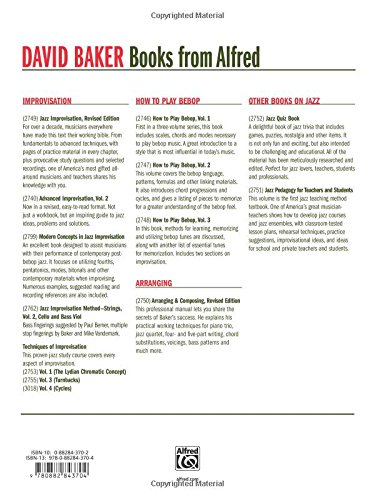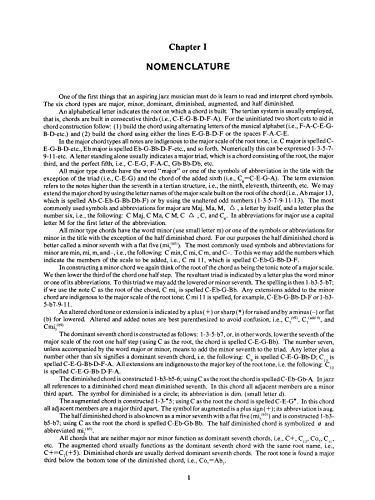Customer Services
Copyright © 2025 Desertcart Holdings Limited
Desert Online General Trading LLC
Dubai, United Arab Emirates





Jazz Improvisation: A Comprehensive Method for All Musicians
T**R
Great book by a great jazz educator
I thought this was a great book. David Baker is a great jazz educator. He made one comment that I felt was earth-shattering (in a good way). He commented on how knowledge of jazz has grown to the point it's difficult to learn jazz improvisation without professional help. This made me feel much better as a lifelong, self-taught student who found the average local jazz musician cannot, or will not articulate how he learned to improvise. There is a lot of inadequate teaching out there, and David Baker fills the gap. I recommend his Aebersold Book as well where he provides 8 original jazz tunes. Search on David Baker Aebersold. It's a blue cover book with red or white lettering. It has Mirroire Noir, Bossa Belle and other jazz tunes in it, that are more modern than traditional, classic jazz tunes. More in line with songs by Herbie Hancock such as Watermelon Man but with more complex chord changes and melodies. Anyway, I won't be reselling this book any time soon!
A**T
A must for the Jazz student
I got this to learn some of the secrets of improvisation. It is jam packed with exercises, scales, chords and studies for the novice to experienced jazz musician. It is a must for anyone interested in improving their knowledge and skills in improv.
M**T
Five Stars
excellent
J**I
Essential
Its the basics of improv get through this book and you will be a master. This stuff is challenging and it kicks up your chops to a whole different level. its one thing to make good licks. its another to actually know what your doing.
D**R
A lot on information in this book, with enough ...
A lot on information in this book, with enough practice material for several years. The concepts are valid for the very advances performer.
T**I
Excellent post-beginner text!
This is a great book. I have to admit that I left this one sitting on my shelf for months, read chapter one and put it back down again for months. But, after picking this up again, reading it with greater intent, and scanning the entire book (which I did not do before) I've concluded that this is an excellent wide-ranging resource: it covers a variety of topics - theoretical basics (like approaches to improv) and practical - how to play jazz bass lines. I will say this as a caveat, David writes in a sparse style, which I think is great: everything he says has weight with little or no fluff. In this sense, it could read as too 'analytical' or 'cold' by some, but I prefer a teacher who explains things succinctly and doesn't cushion his/her words. I would disagree with previous reviews that say this book is too systematic. I think that any approach to learning involves a 'system' and that, simply, every system needs to be taken with a grain of salt and recognized as a system and not religious dogma. Every teacher gives a slice of his or her understanding and David serves up a great slice. This would be a great book after getting through Aebersold's How to Play Jazz - some of it would be review, but MOST of it would be a new and challenging supplement.
F**3
The original perhaps, but unfortunately, no longer the best...
I have tremendous respect for what David Baker has done for jazz education and at one point in my improvising life I thought his approach was the be-all/end-all. It still has much to offer the early student, particularly the emphasis on training the ear and developing instrumental dexterity based on extracted patterns taken from the vernacular of actual playing.Looking back, however, the attempt to systematize an approach to learning tunes has a tendency to produce players (quite a few of whom I've met over the years) who relate to jazz as a collection of charts rather than appreciating the many subtle differences in rhythm, melodic phrasing, and use of harmony that characterize various tunes and different players' approaches across jazz eras. Baker's patterns also tend to be very "one-oriented" which robs many of them of a genuine swinging quality and favors playing within bar lines rather than across. Players who've evolved rhythmically can edit or rearrange a lot of this material to express more forward motion and suit their taste. But unfortunately it's the less-experienced players who are more likely to be using books such as this and they may find themselves years later with a feeling they're lacking something.In some ways I feel other writers such as Bert Ligon, Hal Crook, Jimmy Amadie, and Hal Galper have built upon and moved beyond Baker's approach, particularly regarding expressing rhythmic and harmonic flow.
M**L
Highly recommended.
I've been trying to improve my jazz improvisation for years and these books were a breakthrough for me. Highly recommended.
P**Y
Three Stars
as below
S**O
Il migliore
Ho decine e decine di libri sulla didattica jazz, questo è assolutamente il più efficace. Consiglio anche l'altro volume, quello advanced del quale ora non mi sovviene il titolo...
D**I
Ótimo...satisfeito
Gostei
C**N
Il grande Baker
Come tutti i volumi bakeriani, anche questo rispetta il gran nome dell'autore. Veramente un bel libro, chiaro e con esempi utili
A**R
Five Stars
Good to have another approach from an expert.
Trustpilot
3 days ago
4 days ago
2 months ago
1 day ago